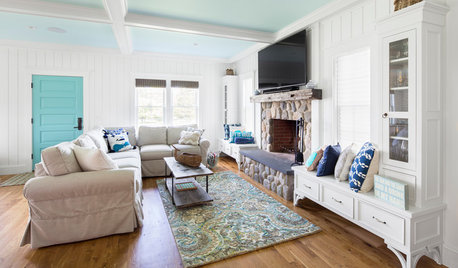Off the beaten path financing
Since I am doing everything else a little atypically, I am now curious. What are the ins and outs of "off the beaten path" ways to finance a new construction project? (Some of these ideas actually came up while talking with lenders, and others while researching those other suggestions)
Therefore, does anyone have experience with or know anything about (Bry?)
40 year FRM (mostly, how to find a lender that offers this product)
Private Portfolio Lender mortgages
Mortgages issued by foreign banks (British or Dutch)
Or any other "non conventional" ideas
For reference, assume we are coming into this with 20% down, and excellent credit score and some decent secondary assets. We just have some unusual circumstances, oddball assets, and a number of factors that make a little exploring worthwhile.
Comments (45)
User
4 years agoThe further afield you stray from conventional, the higher the price will be. That holds true for everything associated with building, including the financing. People with excellent credit and adequate down payments rarely choose to go unconventional because of those costs.
B Carey
4 years agoUsing an in-house lender, you may be able to finance the loan under a shorter term (ARM) by using a higher loan to value down payment.
Related Professionals
Bellview Home Builders · Riverton Home Builders · Valencia Home Builders · Pooler General Contractors · New Bern General Contractors · Plano General Contractors · Waipahu General Contractors · Walnut Park General Contractors · Westchester General Contractors · Corsicana General Contractors · Foothill Ranch General Contractors · Seal Beach General Contractors · Palm River-Clair Mel General Contractors · Avenal General Contractors · Norwalk Home StagersDenita
4 years agoHolly, I have found that small regional lenders are the best resource for portfolio lending. Make sure you check out their guidelines. Some lenders will tell you they are portfolio lenders and yet they underwrite using Fannie or Freddie guidelines.
ShadyWillowFarm
4 years agoIf you can’t get conventional financing, Maybe you need to think about whether or not this is the right time for the project. If you are low risk, you get the best and cheapest terms. When you can’t get those terms, the lender is telling you that you are at higher risk of defaulting. Heed that warning and make sure you can repay the loan if some kind of train wreck comes your way. Apologies for the lecture, I’m sure you know your situation best!! Just hate seeing people get in over their heads.
Holly Stockley
Original Author4 years agoThank you, Denita, for the helpful bit.
It's not a matter of not being ABLE to get a conventional loan. We can. And at a pretty competitive rate. It's more a matter of it might not be the RIGHT loan. And worth a bit of exploration. One thing I've found is that "the way everybody does it" doesn't always make it the better way. And having had my mortgage sold to Wells Fargo before the ink was dry on it last time, I'm interested in mortgage vendors who underwrite their own products, offer some customization, etc.Momofthree Ma
4 years agoHolly, thanks for the clarification. The initial comment sounded like you had a non-conventional income stream or something similar that made conventional financing difficult. It sounds like your best option would be a local lender that keeps their products in house. The only warning with that is that you will usually not get the absolute best rates going that way. We have a mortgage through a local bank and I like the peace of mind of knowing that I can go talk to my local banker if I have a question or an issue, but we pay a slightly higher rate and they only keep jumbo loans in house, so if you were borrowing less than a jumbo it would likely be sold. You should check out the local banks and what their options are for portfolio lending.
remodeling1840
4 years agoBanks look on a mortgage as an investment for them. Therefore they buy and sell investments without worrying about the actual home and homeowners. It is like any other thing that has value. It can be bought and sold on the open market. Don’t take it personally. One of our mortgages was sold three times. The only effect it had on us was the address to which we sent the check and the pay to name we wrote on the check. The terms of your mortgage don’t change. Those terms are written into the contract you have with the original lender. The new bank is buying that contract.
Holly Stockley
Original Author4 years agoOh, I get the mortgages are a commodity, traded in the financial sector. In part, American banks really only like to issue 40 yr FRMs when rates are high - because nobody wants to be stuck holding the note on a long term loan with a LOW rate. That doesn't help their bottom line.
However, the sale to Well Fargo was a nightmare. They are both blisteringly incompetent AND the font of all Evil. So - once bitten, twice shy.
I've, thus far, been a bit disappointed with the local credit unions. Neither was even competitive. Something like 4.012% from one of the banks, vs. 5% for a very similar term loan from the credit union. I'm now making the rounds of local banks, rather than CU's. Waiting for phone calls back.
We (and the property in question) do seem to qualify for the USDA rural development loan program, so that's another avenue to explore.
sushipup1
4 years agoMost credit unions and local banks that originate and keep their own loans can be miserably incompetent at appraisals and all the details of closing. An experienced mortgage broker simply won't have those issues. But then the loan will be sold. Talk to brokers about who actually buys the loans they make. We knew Wells Fargo was buying our mortgage well before we closed, and we have had exactly zero problems. So talk to the brokers with your concerns.
pamghatten
4 years ago40 year loans mostly went away with the financial crisis. Many community banks have portfolio (non-saleable) programs for VIP customers & Private Banking customers. These are relationship based programs, and are where the creativity comes in.
User
4 years agoHaving a problem with the idea of a 40 year loan as you will be paying so much more interest than on a 30 year loan. Perhaps in the future if the interest rates go down you could refinance or remain with the current 30 year. That extra ten years of interest is a killer. Extending a type of loan that could be refinanced in the future for an immediate lowering of current payment is a warning to me that although the OP believes that they are financially secure they should take another look at their projected not current finances.
sushipup1
4 years agolast modified: 4 years agoAny 30 or 40 year loan can be paid down with extra principle payments every month (check that there are no pre-payment penalties), thereby reducing both the term of the loan and the total amount of interest paid over the course of the loan. And you do not need to rewrite the loan, just increase your payment.
Jeffrey R. Grenz, General Contractor
4 years agoLoans written under stadardized saleable guidelines with out restrictions on your part are going to be the least expensive loans you can find.
A portfolio loan is not necessarily saleable if there are any problems so they will charge you a premium for it even if your credit is perfect.
banks use their portfolio loans to make money from loan fees.
Holly Stockley
Original Author4 years agoSushipup hits the nail on the head. Every month or annually, as a lump. Even if it is a somewhat irregular lump. *Wink*. I will investigate private banking options. I might have been better off to work through the branch nearest the business, rather than the one nearest our home, so it could be worth a second pass.
The USDA loan is also high on the list.User
4 years agoWhy are you wanting to complicate things to get charged a lot more money? Because that is exactly what you are doing here. A 40 year loan is not tenable for a private residence, and that is why there’s a penalty against even offering one. It’s a red flag for someone to ask for it. If you can get a standard 30, that’s your best and cheapest choice, always. It does not matter to whom the check goes. Get over your anecdotal hang up on that issue. Unless you want to cost yourself tens of thousands over the years.
Now, if there are credit issues, downpayment issues, or issues with the house not making the appraisal, that’s another story. Having to deal with non standard loans is a whole different thing than wanting to deal with them and cutting off your nose to spite your face out of pique.User
4 years agoWith the comment about USDA I am wondering if the FRM stands for a farm loan and not a regular mortgage. USDA does offer 40 year FRMs to purchase land which could include building a house. But those are two different types of loans with different standards.
B Carey
4 years agoHolly-The USDA has maximum income limits. It is also very possible your assets will knock you out of the running for a USDA loan as it is designed for lower income households.
Your most logical bet will be to deal with a local small town in-house lender.
One Devoted Dame
4 years agolast modified: 4 years agoIf you decide to do a USDA loan, ask more than one financial institution. My husband and I inquired, and our first bank said we "didn't qualify" which I knew was baloney. We asked around, and armed with offers from other institutions, returned a call from our original bank (they wanted our business). They conveniently said that the girl who told us that we didn't qualify, didn't work there anymore, and of course we qualified for USDA.
Our credit scores are over 800, and we had the cash down payment, but chose to go USDA over a conventional loan for a bunch of reasons.
The only explanation I can think of, is that USDA loans aren't as profitable, and therefore, banks attempt to funnel folks away from them. I could be wrong, of course, lol, but that's what came to mind....
Holly Stockley
Original Author4 years agoThank you, Bry. Exactly the sort of thing I was looking for. I appreciate your taking the time to provide the details.
Mrs Pete
4 years agoSeveral random thoughts:
- I specifically remember my high school Algebra teacher making us repeat out loud: "I want a simple interest loan with no prepayment penalty."
- Yes to the Credit Union. Ours has better rates than other financial institutions and has always provided excellent service.
- I have no idea what type of odd-ball mortgages you might find, but interviewing a couple financial institutions might help you learn what's available to you. We purchased our first house through a program for first-time home buyers ... I can't even remember the details, but it was in the days of high interest mortgages, and it was a state program to help young people. How'd we find it? Through our Realtor.
- Run away from 40-years. Run fast. As someone else said, the interest will kill you. Look at the difference between the cost /interest paid for a 15 year and a 30 year loan. When we were first married/bought our first house, we opted for a 30-year loan, but we paid it on a 15-year schedule. We didn't yet have children and didn't know whether I'd continue working, so we felt "safer" knowing we could have fallen back to that 30-year schedule.
- One thing that hasn't been said yet: Keep the amount of your mortgage modest. Consider what you really need.
bry911
4 years agolast modified: 4 years agoEssentially, all US mortgage notes are simple interest.
As for interest, the length stated in the terms of the note doesn't matter at all. A mortgage note is an installment loan, and interest is calculated on the monthly outstanding balance. So everything else being equal, always take the loan with the lowest rate for which you can afford the payment.
Just because you take a 40 year mortgage doesn't mean you can't make the same payments you would have on a 30 year mortgage. Currently, 40 year farms are around a quarter point cheaper in my area, so making the 30 year payment on the 40 year loan would get you paid off in 28 yrs and 6 months. Which is almost a $9,000 of interest savings per 100k financed over the 30 year loan.
Holly Stockley
Original Author4 years agobry, are 40 year FRMs a portfolio product in your area? They seem to not be too available where I am, although I've just tripped over a local bank that does promote their porfolio loan service that I intend to call on Monday.
bry911
4 years agobry, are 40 year FRMs a portfolio product in your area?
No. Fannie Mae and Freddie Mac both buy most flavors of 40 year mortgages.
I know they buy 40 year adjustables (which you absolutely should avoid at all costs), 40 year FRMs, and 40 year balloons (which are amortized as a 40 year mortgage but with the balance due in 30 years). However, I am not sure whether they buy 10 year interest only and 30 year FRM loans.
Try a mortgage broker over a bank. I don't me to be insulting to bank employees but the qualifications to become a loan representative at a bank can often be rather thin. Many are trained on half a dozen popular loan products and nothing else. Bank pay can be rather low, so often the competent people end up in commercial or pulled away by other companies.
homechef59
4 years agoCheck more than one credit union, too. The rules for membership have expanded. They can be very competitive.
My choice would be to find an experienced mortgage broker. Let them earn their fee.
My experience with WF was problem free. One way of making your loan servicing pain free is to insist on doing your own escrow of taxes and insurance. If you put down 20%, you can do this. This will mean that you won't have to deal with the servicer at all other than sending a payment each month. My experience has always been it's the escrow that really gets screwed up.
Holly Stockley
Original Author4 years agoOh, they tried to refinance us to a lower rate, once. That was a nightmare, and if I could have laid hands on the "mortgage agent" in question, I'd have strangled her. We gave up on the refi, even though the lower rate would have been nice. It was that terrible of an experience.
Bry, thank you again. Once we get this silly house up, you're welcome to stop by anytime for coffee and homemade pie.
Holly Stockley
Original Author4 years agoOne more question, Bry: do mortgage brokers ever sell construction to mortgage products? Or would we need to somehow do a construction loan from a bank, the refinance to a mortgage once we have possession?
homechef59
4 years agoTwo ways to do it. A construction loan only. Upon completion, within a specified time frame, you go out and find a regular mortgage. That's done but not as often as the second way. It will require two sets of applications, appraisals and loan processes. That's why you don't see it as often.
The second way is a product called a Construction-to-Perm loan. This is all done as a single package deal. It's really two loans, but seamless. The advantage is a reduced number of hoops to jump through. Upon the issuance of a completion certificate, the construction loan is closed and the permanent loan opened. At that point, it will most likely be sold into the mortgage market.
As an appraiser, I usually saw the construction-to-perm. A draw schedule would be developed by the lender. The builder would review and there might be a small negotiation about the moving something around on the draw schedule. I would get a call that a draw was needed. I would go out to the job site, usually around five times, and certify that the work had been completed. I would write a report and take a few pictures. I would forward this to the lender. A construction draw would be sent to the builder. Upon completion, I would go out and certify that the structure was complete. There wouldn't be a need for a second appraisal. The first would be accepted for making the final loan.
I'd recommend going to a loan broker who deals with construction-to-perm loans.
Holly Stockley
Original Author4 years agoThank you Homechef, to follow up -
The mortgage broker my husband talked to today doesn't do construction loans, only purchase. Is that the case for brokerages in general? Or are there some brokers (as opposed to banks) that will sell a construcion-to-perm product?
Jeffrey R. Grenz, General Contractor
4 years agoIts been a long time since I knew mortgage brokers able to place construction financing, and most lenders they would place the loan would be local (within 90 minutes) anyway with their own loan officers to pay. Aside from the local bank who would make the loan, more fee would have to be charged to pay the mortgage broker.
As @homechef said, there are lenders who do construction to perm, typically larger regional or national lenders, and smaller banks who do the construction loans after making sure you qualify for a perm.
I don't recall if you are DIY or have a builder, but typically if you don't have a builder, they'll want a higher equity or cash reserve to cover the higher risk.
Holly Stockley
Original Author4 years agoOh, every bank in town does construction to perm, and right now they're actually doing some discounting on closing fees. The local building market seems to be cooling off a bit, so their is some promotion going on. What I'm noticing is that the permanent loans being offered on these aren't really what I'm looking for, so I'm fishing around someone who offers that set up and yet come out on the other side with a loan I'm happy with.
homechef59
4 years agoWhen we built our custom home, we had more than 50% down on the project. We arranged for a construction only loan with a bank that was moving into the local area. They needed to establish a book of credible business. We were very low risk for a construction loan because of the large amount down plus we owned the land outright.
The risk that you run with this scenario is the final valuation of the home for loan purposes. You could find yourself with a market shift that isn't in your direction. If you are located in a rural area with few comparable custom homes of the type your are building you will run this risk. (I've seen the plans, they are great.) When you go to get permanent financing, you may have to bring additional funds to the table in order to qualify for conventional financing. This will be at a point where your personal funds will be very low. You will find yourself in a corner with fewer options.
I really think that you are going to have to use a local bank or credit union and get a construction-to-perm loan. If you hate the final loan product or it doesn't meet your long-term needs, you can always refinance into something more acceptable. With this route, you will mitigate the risk of the market taking a downturn and the second appraisal not making the needed valuation.
Remember, the reason this is so hard is that the construction loan business is high risk. Lenders don't like high risk. There is no secondary market for this kind of risk. They want the sure thing as do the bank examiners. That is why the process is split into two buckets, one high risk with no secondary market, one much lower risk with a robust secondary market.
Denita
4 years agoVery well said homechef59. Exactly what I was thinking, only you stated the problem and solution much more eloquently.
bry911
4 years agolast modified: 4 years agoThere are brokers who do construction loans, in fact, there are brokers who only do construction loans. But like any market, the more specialized the fewer people you will find doing it, and even in major cities you may only find one or two brokers specializing in construction loans.
I agree with homechef on the risk. If you only have 20%-30% down then I would recommend a construction to perm loan then creative refinancing. I believe a USDA farm loan can be used for construction and it alleviates some of the equity concerns, but limits on income and amount really make that an option for select few people.
Additionally, remember when looking at equity different banks may have different limits on the amount of land that can be included. In my area, a few banks will limit the appraisal to the house plus 10 acres, that can really mess you up if you have a few hundred acres free and clear and are looking to use that as part of the equity equation.
Holly Stockley thanked bry911B Carey
4 years agoFollowing up on Bry’s comment about the house plus 10 acres....a mortgage with a parcel more than 10 acres isn’t a conforming loan. Conforming loans are loans that get packaged by the requirements they meet and sold as a lot. I don’t remember Holly if you are building on an acreage. My housesite is 13 acres and I will be adding (officially combining with the county) the 8 acre parcel to it within 1 year of building. I would leave well enough alone, but can’t build the buildings I want on an 8 acre parcel (too small) without a house. At 20+ acres, parcels here are considered farmland and you can get by with much more.
Since my housesite is starting at 13 acres, I already am in a position that my loan will be held by the local bank. I don’t qualify for true farmer loans either.
The more ore non-conforming you get, the harder it is to find banks that will provide and service your loan.It sounds like you may be looking both for someone to creatively look at business income and also possibly allow lump sum mortgage payments. You also need a lender that will take new construction risk. Higher down payments help mitigate these risks to the lender. You may also consider adding a Heloc after construction to pull payments from to be repaid during lump sum business payouts.
My local lender in our small town of 1,500 people does a lot of farm loans. He routinely has to look more creatively at loans while still making good lending decisions. They also allow owner-builder loans and several of my friends have done that in the last few years. The bank is now associated with a larger bank in the adjacent large town...but retained its ability to make their own loan decisions.
Holly Stockley thanked B CareyHolly Stockley
Original Author4 years agoThank you, B Carey. We'll take another crack at some of the local banks. They're not always the most efficient at returning phone calls, and you have to get past the first person who only repeats, "I don't know.".
We are (well) over the income limit for the USDA program. It's a sufficiently rural area that it is worth looking for the area lender that knows that market.
bry911
4 years agoMy understanding on the ten acre rule is a bit different, homechef might weigh in on conditions...
You can make a loan on more than ten acres conforming. The ten acre rule is where it switches from automatic approval to proof of use. If the land is residential the loan can be conforming with acreage.
If mixed use or agricultural then you move to non conforming. The presence of outbuildings is a big indicator, so a trick that gets used around this area is to break off all outbuildings in a separate plot and build the house on the remaining land. So you will get these crazy thin rings of barns and sheds surrounding a residential plot.
shead
4 years agolast modified: 4 years agoI apologize if this has already been said but check out Farm Credit. It’s not the same as FSA (USDA) and I know they do construction loans because we’ve used them for that before. We currently have a land loan with them. I’ve always found their rates and terms much more competitive than our local banks. Plus, they usually have a yearly dividend because it’s a cooperative. Last year, we got a check for $1800 because they’d had a good year. That was about 1.5 monthly mortgage payments given back to us.
We checked with FSA about their 40 year loans but those are for people with low credit scores and low equity. We didn’t qualify because we were basically “too low of a risk.” Those loans are typically for first time farmers.Jeffrey R. Grenz, General Contractor
4 years agoConstruction to perm loans include the lender taking the risk the home will be completed and a perm loan will be available 12-24 months out that takes you out of their portfolio. You pay more for that service (const to perm). Construction is the high risk & high cost portion of the project. DIY adds more risk to the lender. For some consumers, the peace of mind in having that already in place is worth the added cost.
When your home is completed, appraisal ready, finaled, etc. you can then take advantage of the best permanent mortgages you and the project qualify for.Holly Stockley
Original Author4 years agoI just want to take a minute to thank everyone for all the feedback and suggestions. There is actually a wealth of info in here, and even if it's not all directly useful to me it's likely to be useful for someone.
I will give a look at Farm Credit. There are no outbuildings yet, and no plan to do that until after the house is built. So that might affect a few things, but it's worth pursuing.
We MAY have found a lender interested in doing this, so I owe you all for the assistance.
JudyG Designs
4 years agolast modified: 4 years agoSomething along the lines of Jeffrey’s comment above of getting the house up before you commit to a traditional mortgage:
Raw land doesn’t add much to your borrowing power.
Could you qualify for additional asset based lending? It is short-term, but it will give you the money to get the house built and landscaping done. Now the raw land has contributed to the valuable package. You might be surprised at the loans/rates available to you.
I am not speaking as an financial expert; only as a consumer, but we did this financing once and it worked to our advantage.
Jeffrey R. Grenz, General Contractor
4 years agoMessage from a client's lender this morning reminded me that the const to perm loans are variable & that she was approaching the client of the just completed project for a refi. A good time to fix a mortgage.
worthy
10 months agolast modified: 10 months agoWell, Chris isn't GPT, which nicely summarizes and organizes all the info upstream with no evident lies.
GPT:
"When it comes to financing a new construction project, there are indeed some "off the beaten path" options you can explore. While I don't have information specific to a person named Bry or their experiences, I can provide you with general information about some unconventional financing ideas. Here are a few possibilities:
- 40-Year Fixed-Rate Mortgage (FRM): Some lenders offer 40-year FRMs, which can be beneficial if you're looking for a longer loan term to reduce your monthly payments. To find lenders offering this product, you can start by researching local banks, credit unions, and mortgage brokers. Reach out to them directly and inquire about their loan options.
- Private Portfolio Lender Mortgages: Private portfolio lenders are individuals or companies that provide loans using their own funds. These lenders often have more flexibility in terms of qualifying criteria and loan structures. You can try searching for private portfolio lenders in your area or consider working with a mortgage broker who specializes in connecting borrowers with private lenders.
- Mortgages from Foreign Banks: It is possible to obtain a mortgage from a foreign bank, such as British or Dutch institutions, for a property located in another country. This option may be suitable if you're constructing a property in a different country. Research foreign banks that operate in the country where you plan to build and reach out to them to inquire about their mortgage products.
- Non-Conventional Ideas: Apart from the above options, there are other non-conventional financing ideas worth exploring. Some examples include:
a. Crowdfunding: Platforms exist that allow you to raise funds from multiple investors who contribute smaller amounts, collectively financing your project.
b. Peer-to-Peer Lending: Peer-to-peer lending platforms connect borrowers directly with individual lenders who are willing to fund the project.
c. Seller Financing: In some cases, the property seller may be willing to finance the construction project by accepting regular payments instead of the full purchase price upfront.
d. Joint Ventures: Partnering with an investor or developer who has experience in construction projects could provide additional financing options.
Remember, each financing option has its own requirements, terms, and risks. It's important to thoroughly research and evaluate each choice, and consult with professionals such as mortgage brokers, real estate attorneys, and financial advisors to assess which options best align with your specific circumstances."
Pretty soon, we'll all be redundant. :-(( Hear that Charlie Brooker?
billi38
10 months agoIndeed, sometimes bank loans can help, I am not a supporter of lending, because I have to give a loan with considerable interest. But if, for example, you need a loan to raise a business, then this is an option, you just need to look for the most profitable loans.



















bry911